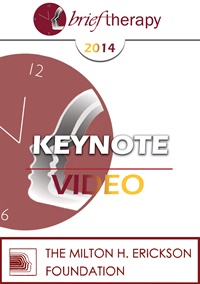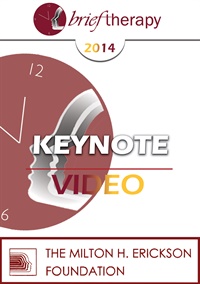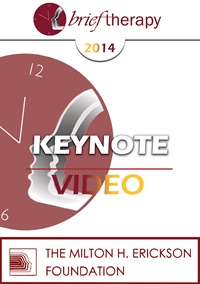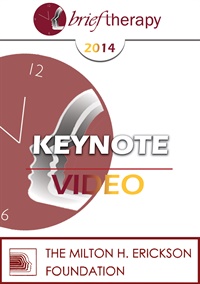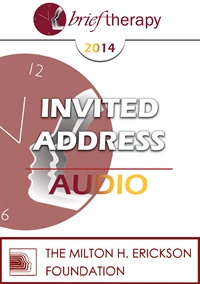
- Average Rating:
- Not yet rated
- Topic Areas:
- Depression | Hypnosis | Invited Addresses | Experiential Therapy | Neuroscience | Brief Therapy
- Categories:
- Brief Therapy Conference | Brief Therapy Conference 2014
- Faculty:
- Michael Yapko, PhD
- Duration:
- 1:08:02
- Format:
- Audio Only
- Original Program Date:
- Dec 14, 2014
- Short Description:
- How a clinician thinks about the nature of depression and answers fundamental questions - such as what causes depression - naturally determine what treatment approach he or she is most likely to take. Regardless of one’s preferred orientation, however, depression experts agree that treatment needs to be multi-dimensional and active. Furthermore, the more we learn about the neuroscience of depression, especially neuroplasticity and neurogenesis, the more important well designed experiential learning processes become in treatment.
- Price:
- $15.00 - Base Price
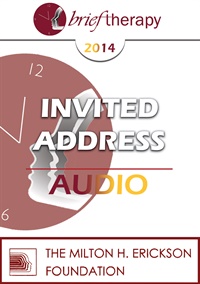
- Average Rating:
- Not yet rated
- Topic Areas:
- Invited Addresses | Brief Therapy | Generative Psychotherapy | Psychotherapy
- Categories:
- Brief Therapy Conference | Brief Therapy Conference 2014
- Faculty:
- Stephen Gilligan, PhD
- Duration:
- 1:02:32
- Format:
- Audio Only
- Original Program Date:
- Dec 14, 2014
- Short Description:
- Generative psychotherapy is an exploration of how individuals can forge positive, therapeutic responses to life challenges. This invited address concentrates on the three core connections that allow clients to do this: (1) Positive intention and goals (What do you most want to create in your life?); (2) Somatic Centering (Where do you feel the deepest resonance in your body?); and (3) Field Resources (What can most deeply support your path of change?).
- Price:
- $15.00 - Base Price
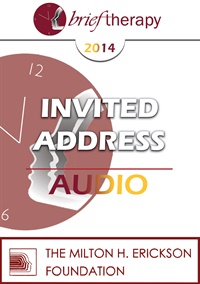
- Average Rating:
- Not yet rated
- Topic Areas:
- Post-Traumatic Stress Disorder (PTSD) | Invited Addresses | Memory | Brief Therapy
- Categories:
- Brief Therapy Conference | Brief Therapy Conference 2014
- Faculty:
- Steve Andreas, MA, NLP
- Duration:
- 59:20
- Format:
- Audio Only
- Original Program Date:
- Dec 14, 2014
- Short Description:
- The phobic core of PTSD is a conditioned response to a terrifying event, easily treated with a process demonstrated in an 8-minute video. Learn the key components that combine to make this method so effective. Other co-occurring problems—grief, rage, anxiety, guilt, shame, drugs, etc.—require different processes for resolution.
- Price:
- $15.00 - Base Price
Tags: Brief Therapy Memory PTSD
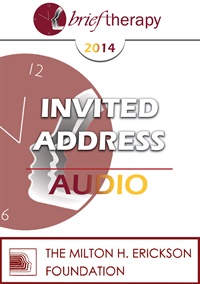
- Average Rating:
- Not yet rated
- Topic Areas:
- Happiness | Invited Addresses | Mindfulness | Brief Therapy | Buddhism
- Categories:
- Brief Therapy Conference | Brief Therapy Conference 2014
- Faculty:
- Ronald Siegel, PsyD
- Duration:
- 1:00:54
- Format:
- Audio Only
- Original Program Date:
- Dec 14, 2014
- Short Description:
- Everyone wants to be happy. While clinicians and researchers traditionally focused on helping troubled people feel less distressed—moving from -5 to 0 on the happiness scale—more recently they’ve branched out to investigate what actually leads to enhanced well-being. Some research findings point in surprising new directions, while others echo advice heard from wise elders and religious teachers across cultures and centuries.
- Price:
- $15.00 - Base Price
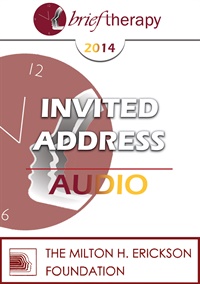
- Average Rating:
- Not yet rated
- Topic Areas:
- Invited Addresses | Brief Therapy | Future Oriented
- Categories:
- Brief Therapy Conference | Brief Therapy Conference 2014
- Faculty:
- Bill O'Hanlon, MS
- Duration:
- 1:04:06
- Format:
- Audio Only
- Original Program Date:
- Dec 14, 2014
- Short Description:
- Most therapy orients to the past. This session will offer an alternative, using "future pull," a method of engaging people in compelling preferred futures and working backwards to the near future to create change in brief therapy.
- Price:
- $15.00 - Base Price
Tags: Future Oriented Brief Therapy

- Average Rating:
- Not yet rated
- Topic Areas:
- Invited Addresses | Relationships | Brief Therapy | Couples Therapy
- Categories:
- Brief Therapy Conference | Brief Therapy Conference 2014
- Faculty:
- Pat Love, EdD
- Duration:
- 56:15
- Format:
- Audio Only
- Original Program Date:
- Dec 14, 2014
- Short Description:
- Relationships have changed since the dawn of the 21st century. Dating, mating, single life, sex-life, monogamy, matrimony, cohabitation, co-operation—all look different than a generation ago. As if it weren't challenging enough to keep up with pathological, technological, ethnic, educational, gender, geographic, socioeconomic, and sexual diversity, we now have the largest generational gap in modern history to contend with which means the relationship expectations and mores that made total sense to the Boomers now baffle many Millennials.
- Price:
- $15.00 - Base Price
- Average Rating:
- Not yet rated
- Topic Areas:
- Attachment | Keynotes | Psychotherapy | Brief Therapy | Couples Therapy
- Categories:
- Brief Therapy Conference | Brief Therapy Conference 2014
- Faculty:
- Sue Johnson, EdD
- Course Levels:
- Master Degree or Higher in Health-Related Field
- Duration:
- 1:03:37
- Format:
- Audio and Video
- Original Program Date:
- Dec 11, 2014
- Short Description:
- There are currently over 400 specific approaches to psychotherapy and many therapeutic tribes. Attachment theory and science with its intrapsychic and relational focus offers the therapist a broad, integrative but systematic guide to the nature of dysfunction and health and how to move individuals, couples and families from one to the other. This presentation will offer a guide as to how this science can help to make our sessions relevant and on target in terms of leading to better affect regulation, cognitive coherence and supportive, stable relationships.
- Price:
-
Sale is $29.00
price reduced from Base Price - $59.00
- Average Rating:
- Not yet rated
- Topic Areas:
- Keynotes | Trauma | Post-Traumatic Stress Disorder (PTSD) | Brief Therapy
- Categories:
- Brief Therapy Conference | Brief Therapy Conference 2014
- Faculty:
- Donald Meichenbaum, PhD
- Course Levels:
- Master Degree or Higher in Health-Related Field
- Duration:
- 58:02
- Format:
- Audio and Video
- Original Program Date:
- Dec 12, 2014
- Short Description:
- Following the exposure to traumatic and victimizing experiences, 75 % of individuals will be impacted, but they go onto evidence resilience and in some instances post traumatic growth. In contrast, 25 % will evidence PSTD and persistent adjustment disorders. In this presentation, Dr. Meichenbaum will discuss what distinguishes these two groups and the implications for treatment decision making. He will use a Constructive Narrative Perspective to demonstrate how to bolster client's resilience.
- Price:
-
Sale is $29.00
price reduced from Base Price - $59.00
- Average Rating:
- Not yet rated
- Topic Areas:
- Keynotes | Trauma | Brief Therapy | Neuroscience
- Categories:
- Brief Therapy Conference | Brief Therapy Conference 2014
- Faculty:
- Bessel van der Kolk, MD
- Course Levels:
- Master Degree or Higher in Health-Related Field
- Duration:
- 1:02:01
- Format:
- Audio and Video
- Original Program Date:
- Dec 14, 2014
- Short Description:
- Neuroimaging and EEG measures of traumatized individuals show significant changes that must be taken into account for treatment to be effective.
- Price:
-
Sale is $29.00
price reduced from Base Price - $59.00
Tags: Brief Therapy Neuroscience Trauma
- Average Rating:
- Not yet rated
- Topic Areas:
- Keynotes | Post-Traumatic Stress Disorder (PTSD) | Brief Therapy | Trauma
- Categories:
- Brief Therapy Conference | Brief Therapy Conference 2014
- Faculty:
- Philip Zimbardo, PhD
- Course Levels:
- Master Degree or Higher in Health-Related Field
- Duration:
- 2:05:42
- Format:
- Audio and Video
- Original Program Date:
- Dec 14, 2014
- Short Description:
- For over 20 years, Dr. Zimbardo has researched the power of relationship with time has on our lives. He has co-authored two published books on the topic, The Time Paradox and The Time Cure, and developed the Zimbardo Time Perspective Inventory (ZTPI) which has been translated into over 24 languages and validated globally. his talk will review the major research on time perspective and introduce his work with Dr. Richard Sword and Rosemary Sword on Time Perspective Therapy, a brief therapy intervention to treat Post-Traumatic Stress Disorder.
- Price:
-
Sale is $29.00
price reduced from Base Price - $59.00
Please wait ...


